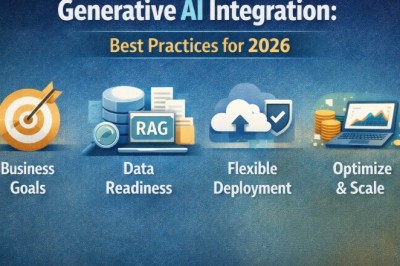views
In the wake of the global pandemic, remote work has swiftly transformed from an optional perk to an essential mode of operation for businesses across industries. As remote work becomes more commonplace, Human Resources (HR) professionals are tasked with reimagining traditional team dynamics and developing strategies that foster virtual team success. In this article, we will delve into a comprehensive blueprint that HR can follow to revolutionize remote work and ensure the triumph of virtual teams. By incorporating a range of remote work tips, HR can empower teams to thrive in this new work landscape.
1. Redefining Recruitment and Onboarding
The first step towards a successful remote team is identifying the right talent. HR professionals must adapt their recruitment skills to assess candidates not only for their technical abilities but also for their capacity to thrive in a remote setting. Strong communication skills, self-discipline, and adaptability are key traits to look for.
Moreover, onboarding takes on a whole new significance in remote work scenarios. Virtual onboarding processes should include clear guidelines on tools, communication channels, and company culture, while also emphasizing how to navigate asynchronous work effectively. Assigning a mentor to new hires can help them acclimate faster and feel connected from the start.
2. Crafting Clear Communication Channels
Effective communication forms the bedrock of remote teamwork. HR must ensure that teams have access to a variety of communication tools, from instant messaging platforms to video conferencing software. Encourage the use of video calls whenever possible, as they foster a stronger sense of connection than text-based communication.
Establish guidelines for expected response times and communication etiquette to prevent misunderstandings. Regular team meetings and one-on-one check-ins can help maintain open lines of communication and address concerns promptly.
3. Setting Transparent Expectations
Remote work can blur the lines between personal and professional life, leading to potential burnout. HR should collaborate with teams to set clear expectations regarding work hours, availability, and deliverables. Flexibility is important, but it should be balanced with a structure that maintains productivity and prevents overworking.
Creating a shared document outlining project timelines, goals, and individual responsibilities can keep everyone on the same page. Regularly revisit and update these documents to adapt to changing circumstances.
4. Fostering a Virtual Culture
Maintaining a strong company culture in a remote environment requires conscious effort. HR can organize virtual team-building activities, such as online games, workshops, and collaborative projects. Celebrate milestones, birthdays, and achievements to ensure that remote employees feel valued and included.
Encourage team members to share their hobbies and interests outside of work in dedicated communication channels. This not only humanizes colleagues but also helps in forming meaningful connections.
5. Prioritizing Well-being and Mental Health
Remote work can be isolating, potentially affecting employees' mental well-being. HR should emphasize the importance of work-life balance and offer resources that support mental health. Employee assistance programs, counseling services, and flexible hours can go a long way in promoting well-being.
Promote healthy habits by sharing tips on ergonomics, exercise, and stress reduction. Regularly check in with team members to gauge their emotional state and provide assistance where needed.
6. Empowering Self-Development
Virtual teams should be encouraged to continually enhance their skills. HR can collaborate with managers to identify online training resources, webinars, and courses that align with employees' career goals. Regular skill-sharing sessions within the team can also provide an avenue for learning.
Offer opportunities for career growth and advancement within the remote framework. When employees see a clear path for development, they are more likely to remain engaged and motivated.
7. Evaluating Performance Objectively
Traditional performance evaluations may need to be adapted for remote teams. HR should work with managers to establish measurable goals and key performance indicators that accurately assess remote employees' contributions. Regular feedback sessions should focus on achievements, challenges, and areas for improvement.
It's important to recognize and reward exceptional performance. Consider implementing a virtual recognition system that highlights outstanding work and encourages a culture of excellence.
8. Strengthening Cybersecurity Measures
Remote work introduces new cybersecurity challenges. HR must collaborate with IT departments to ensure that remote employees have secure access to company networks and tools. Regular cybersecurity training can educate teams about potential threats and best practices for safeguarding sensitive information.
Encourage the use of password managers, two-factor authentication, and encryption tools to fortify digital security.
9. Adapting to the Future
The remote work landscape is dynamic, with technology and trends evolving rapidly. HR should stay informed about the latest tools and practices that can enhance virtual team collaboration. Regularly solicit feedback from employees about their remote work experiences and use that information to refine existing processes.
As the boundaries between remote and on-site work continue to blur, consider implementing a hybrid work model that combines the best of both worlds.
Conclusion
Remote work is not just a temporary solution; it's a new way of working that requires a strategic approach. HR professionals play a pivotal role in guiding this transformation by redefining recruitment, prioritizing clear communication, nurturing a virtual culture, and championing well-being. By implementing these remote work tips, HR can set the stage for virtual team success and contribute to a resilient, adaptable, and successful organization in the modern era.


























Comments
0 comment